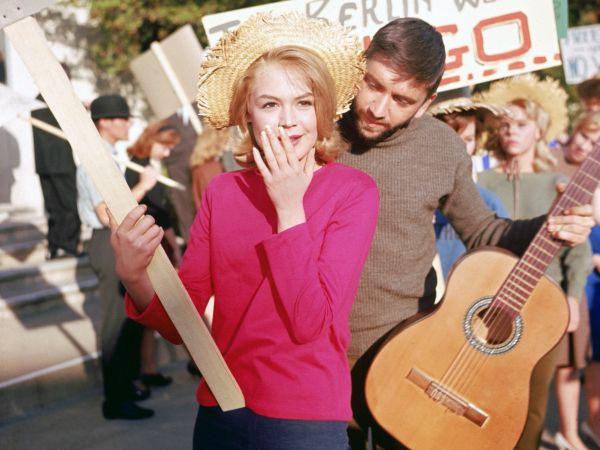November 13, 1963
Fox
Comedy, Musical
VHS
B-
Inspired by the play by the Ephrons, who in turn were inspired by daughter Nora's letters home from college, this provides an early look at what would in a few years be known as the generation gap. Yes, earlier movies showed parents dealing with their high-school and college-age children (including not only Dee's Gidget but Stewart's It's a Wonderful Life). But this one shows some very '60s-specific issues, particularly in Mollie's (Dee's) freshman year, when she embraces protest and folk music.
But her father, Frank Michaelson, played by Stewart, is more worried about the college men she may be embracing. Although there are some borderline tasteless moments, overall the film offers a sweet if very dated look at a man dealing with "the awakening of sex in his daughter." Her dad not only wants Mollie to stay a virgin, but he believes that a woman's ultimate happiness is through marriage. Mollie, despite her social consciousness and her interest in modern art, ends up marrying a rich, handsome, young Frenchman, and that presumably is enough for her happy ending. (At 19! But the average age for women marrying for the first time in '63 was 21.) How this differs from a '50s film-- other than of course Wilder's Sabrina-- is that it's not clear that Mollie keeps her V-card until the wedding night, and ultimately it doesn't really matter. And if she has had sex with her French boyfriend, at least she doesn't seem to be pressured into it, after being ogled, hit on, and even harassed by various men, including her high school art teacher! The variations on this theme of the protective dad's "dish" daughter would play out as the '60s moved on and American cinema tried to cope, particularly in Bob Hope "sex comedies."
We get a bit of Mollie's perspective, although the movie is mostly told in Mr. Michaelson's flashbacks. I'm using the "musical" tag because Dee shows she can sing and dance in a few different numbers, although she's not showcased in the way she'll be in Doctor, You've Got to Be Kidding! (That's the movie where I most often reinterpret the Grease lyrics, "Look at me, I'm Sandra Dee, lousy with virginity," because she is lousy at dealing with her screen "virtue," particularly in that film.) Here she sings not only folk but a French song, as well as dancing the can-can. She's accompanied on the guitar very briefly by everybody's favorite TV beatnik Bob Denver, not yet transitioned to goofy Gilligan. Equally scene-stealing is the ever quotable Robert Morley. (While everyone else keeps mistaking Mr. Michaelson for Jimmy Stewart, ha ha, Morley's Mr. Pope-Jones is convinced Frank looks like Henry Fonda.)
Eugene Borden also played a Frenchman in All About Eve, as did Marcel Hillaire in Sabrina (as the professor at the cooking school). Jack Chefe was in Please Don't Eat the Daisies. Harry Carter, Pitt Herbert, Gene O'Donnell, and Charles Robinson would be in Dear Brigitte with Stewart. (Henry Koster would again direct, but Nunnally Johnson would be uncredited for his work on that script.) Irene Tsu (Miss Wu here) and Jane Wald would do John Goldfarb, Please Come Home! James Brolin, who's one of the boys greeting Mollie at the airport when she first goes off to college (he was then 23), would be in both movies. Cynthia Pepper would be in Miss Congeniality 2.

No comments:
Post a Comment